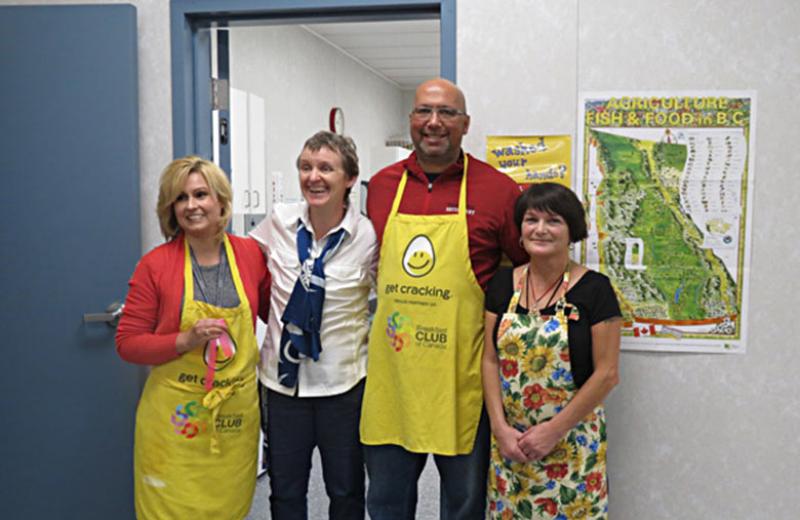“However the spirit moves you.”
That’s the cooking advice you will often hear Laurie Mutschke, School Meal Coordinator, share with her students at Parkside Secondary School in Terrace. Among her other roles, she runs the school’s daily hot lunch program that serves meals made from scratch.
The school receives donations from the local Food Share program, Terrace Church’s Food Bank, Donna’s Kitchen and Catering, and Breakfast Club of Canada, along with food from the local community garden where the students help out. Nothing goes to waste – even the food scraps get put into the aptly named “Critter Bin.” The students also get credit for helping Laurie in the kitchen. When fresh produce shows up at the school, they often decide what to make for lunch.
I met with Laurie and Terri Finlayson, Foods, Science and Life Skills teacher, to learn more about the program. They recently celebrated the grand opening of their brand-new kitchen, and I was happy to get a tour of the beautiful facility. As we chatted, Laurie and Terri shared many stories. I quickly learned why their school’s kitchen is so much more than just a place to cook.
Tell me more about the staff and students at your school!
Laurie: “[Parkside] is considered an alternate school… there is a lot of flexibility in terms of individual education plans. So, maybe today English isn’t something you want to do, maybe you can work in the kitchen. I think, along with the students being a unique group, we really do have a different blend of teachers with different passions.”
How did you start getting the students involved with cooking?
“Sometime they just come to you and say, “Can I help?” Sometimes I don’t even need the help, but I pull them in because I see that they need to come in. I will go to the teachers, and ask, “Can I have her help? She’s lost today, and she needs something.”
How has cooking helped you build connections with the students?
Terri: “As you’re busy cooking, you can have those conversations. If you’re sitting down, one-on-one, looking at them in the face, [students] will often shut down. But if you’re doing something else and you just casually start talking, you get into these topics that you normally never do.
And because [Laurie] doesn’t have that designated teacher role, a lot of kids feel comfortable talking to [her]. They come into the kitchen and now you’ve built that relationship. It’s a special thing, and you have to be a certain way as a person, not just a cook. You’re a counsellor, you’re a cook, and you’re also dealing with hygiene and teaching life skills.”
What other positive impacts has the cooking program had on students’ mental wellness?
Laurie: “They can feel good about themselves. They have a special job that makes them feel so important. On the lunch line someone says, ‘This is great, Laurie!’, and I say, ‘Don’t thank me – So and So made that!’ Just the connection you get over food, and their sense of their accomplishment.
Sometimes being in the kitchen becomes the reward. Not the eating of the food, but the preparing. We have a young lady who is on a very limited part-time schedule, but on certain days she does the baking… While they wait for whatever to be baked, [she] and her sister work on math in the kitchen. That then becomes her safe spot.”
What other activities are the students involved in?
Terri: “We take the students fishing and hiking, they gather the blueberries from up in Shames [Mountain]. We have an equestrian riding program. One of the teachers does crafts and sewing. I think that’s all part of the health piece too, because it helps them be healthy; not just eating, but in every way. A lot of them find that when they deal with their anxiety,they feel so much better.”
Laurie: “There is something here for everyone. Maybe you’re the kid that wants to go for a hike, or maybe you’re the kid that wants to cook in the kitchen. They do get excited because it’s taking the classroom outside, it’s not just sitting at a desk.”
People often say that the kitchen is the heart of the home. The staff and students at Parkside Secondary could not agree more! Just like at home, their kitchen wears many hats: it’s a place to build relationships, to learn new skills, to enjoy good food with friends, and most importantly, it’s a place to feel safe and cared for.
Interested in starting a youth cooking program? Contact a Northern Health Population Health Dietitian for suggestions and resources at 250-631-4265 or PopHthNutrition@NorthernHealth.ca. Or visit the Northern Health Healthy Eating at School webpage.
(Editor’s note: This article first appeared in Northern Health’s Healthier You – Fall 2018 edition on Youth Mental Wellness. Read the full issue here.)














Comments